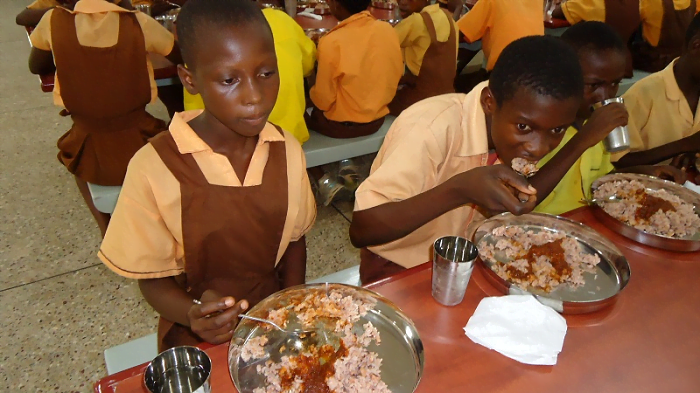Caterers under the school feeding programme have still not been paid by the government. This means the strike of the caterers could continue possibly into its 5th week.
The caterers on Tuesday, June 7, 2022, embarked on a demonstration in Accra to register their displeasure over the government’s failure to pay them their arrears and increase their feeding grants.
The Ghana School Feeding Programme is an initiative of the comprehensive Africa Agricultural Development Programme Pillar 3, which seeks to enhance food security and reduce hunger in line with the United Nations (UN) Sustainable Development Goals (MDGs) on hunger, poverty and malnutrition.
The government currently provides 97 pesewas for a child per day for a plate of food.
The amount is considered inadequate to provide an adequate and healthy diet for child development.
With this in mind, many were surprised when the government decided to dole out an additional Ghc25 for the construction of the National Cathedral.
Speaking about the deficiencies in the education sector, Educationist and Management Expert, Nii Armah Ardey explained that the challenges persist only because of the lack of political and financial commitment from the government.
Adding his voice to the many who have chastised the government for the donation towards the construction of the Cathedral, Mr. Ardey wondered where the government’s priorities lie.
“It is about priority and it is a leadership call. Leadership has to decide what it wants to do. The arguments this morning on some of our leading media platforms, are whether the government has to spend money on the National Cathedral or pay school feeding caterers, national service personnel or pay teachers their Cost of Living Allowance (COLA) etc.”
“As a Christian, I would say I love the National Cathedral. As someone who has also had the opportunity to visit other countries; I mean, anytime I am in London, I go to Westminster Abbey. I am happy when I sit in those places, but it is about priority. It is about what to do at a particular time. If education is suffering; if school feeding is not being paid for, as a result, children are not going to school because they cannot get their one meal, is it the National Cathedral that matters?”
“If national service personnel are not paid, if teachers are not getting their COLA; you would want to assess whether putting in all the money into the cathedral at this moment, because you have a deadline to meet and leave education is right. Does your priority to complete the National Cathedral supersede the priority of the quality of education?”
“It is a leadership call. Leadership prioritizes its affairs So if they feel that they can put something ahead of other things, then that is a leadership call,” he said.
Earlier, Mr. Ardey wondered whether successive governments are more interested in just enrolment numbers at the pre-tertiary level of education or rather concerned about the quality of education.
Mr. Ardey explained that over the years, the government have committed resources towards expanding access to education with very little concern for the quality of education.
He said corresponding attention needs to be given to the quality of education offered at these levels to ensure that young students have solid foundations.
On the same issue, Dr. Clement Abass Apaak, the Member of Parliament for the Builsa South Constituency and Deputy Ranking Member on the Education Select Committee expressed grave concern about the quality of students produced under the NPP government’s flagship educational programme; Free Senior High School (Free SHS).
According to Dr. Apaak, while the students graduating from the Senior High Schools may have excellent grades on paper, they have no proper substance.
This means that when they further their education to the tertiary level, there is an extra burden on lecturers.
To this end, tertiary institutions could soon be forced to implement a policy that would compel university entrants to sit for a common entrance exam. This would determine whether or not, they would be allowed to study at a particular university.
Source: A1radioonline.com|101.1MHz|Mark Kwasi Ahumah Smith|Ghana


